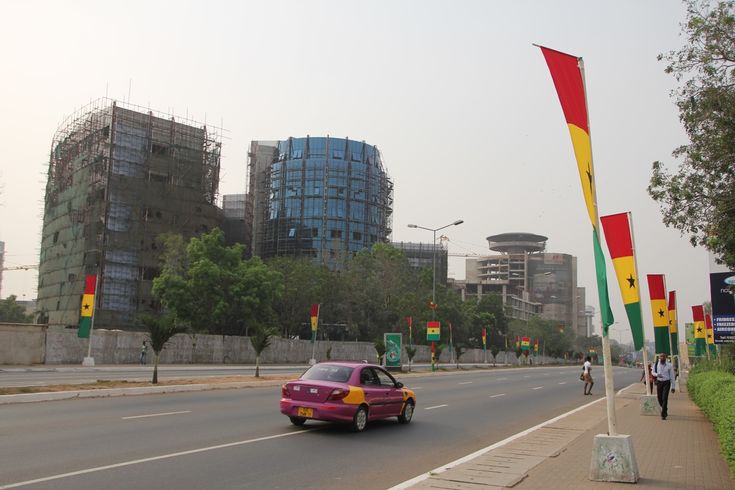
Business and Financial News, Expert Opinions & International News How DeepSeek AI is Disrupting the...


21.10.2020
The novel coronavirus is claiming lives and crippling economies around the world. Historical accounts and some development economic literature have shown that pandemics, to a large extent, inevitably cause enormous changes in economies, politics, international relations, religion, institutions, human interaction, and technological advancement, etc. What do all these pandemics mean to both the developed and the developing countries? Proceeding to the substantive issues, it is imperative to educe from history before establishing the dynamics of change and developments that are likely to occur after the pandemic.
Since 430 B.C the world has sporadically been experiencing and grappling with epidemics and pandemics, which often cause massive human deaths and also lead to economic meltdowns. Some of the earliest recorded pandemic and plagues in history include; The Athens which occurred during the Peloponnesian War between Athens and Sparta, the Antonine Plague which occurred in 165 A.D, the Cyprian Plague in 250 A.D, and the Justinian Plague in 541 A.D. Furthermore, in 1347 A.D, the world was hit by the infamous plague which is also referred to as the Bubonic Plague or the Black Death. The Great Plague of London also happened in 1665, The Third Plague pandemic in 1855, the Fiji Measles Pandemic in 1875, the Russian Flu in 1889. In not so long a century, one could mention the Spanish Flu which occurred in 1918, the Asian flu which occurred in 1957, and SARS which occurred in 2003. Considering the trajectory of the several plagues the world has suffered from, it is important to emphasize that, to help project the likely transformative opportunities therein for Africa, the bubonic plague will mainly be juxtaposed to the coronavirus. This is because the Bubonic plague or the Black Death is recorded in human history as one of the most fatal outbreaks the world has ever experienced.
The Bubonic plague or the Black Death, according to the estimates of historians, reduced the then world population of 475 million to between 350 and 375 million. Historical accounts also show that it started from China in 1334 and spread along trade routes to Europe via Sicilian ports in the late 1340s. By spring 1348, this plague had spread through France, Britain, Italy, and subsequently entered Africa. The Bubonic plague had an economic, social, and political impact on medieval European societies. It is believed that the 15th century was a golden age of prosperity and new opportunities for the European countries after the plague had ended. It is noteworthy that the ginormous reduction in the workforce led to an increase in wages after the plague ended. Some theoretical strands try to link the 18th century Industrial Revolution, which began in Britain and later spread to other parts of the world, to the high labor wages which were also a consequence of the Black Death and other plagues like the Great Plague of London.

In that, Capitalists in their quest to search for labor-saving technology consequentially resulted in a technological revolution.
Following the cataclysmic effect the Bubonic pestilence had on the world, authors” – Daron Acemoglu and James A. Robinson (2012) – of the book “Why Nations Fail” refer to this as the Critical Junctures. They expound that a “Critical Juncture is a major event or confluence of factors that disrupt existing economic or political balance in society”. This write-up dovetails with this concept to show the positive transformative impact the post-coronavirus could have for Ghana and by extension Africa. A Critical Juncture, as postulated by the two authors, “is a double-edged sword that can cause a sharp turn in the trajectory of a nation”. It, therefore, means that a country amid the massive deaths and serious challenges of critical junctures can still seize the opportunity offered to strategically put in place transformative systems and structures and vice versa.
Daron Acemoglu and James A. Robinson (2012) state that the Second World War – that lasted from 1939 to 1945 – created critical junctures for many former colonies of Europe. However, in most cases in sub-Saharan Africa and many in Asia, the post-independence governments simply did not clutch the opportunity. In their accounts, Botswana was the only African country that took advantage of that critical juncture and launched itself into the path of progress. In a similar vein and a most recent case, one could cite Rwanda as a country that has taken advantage of the critical juncture after the Rwandan Civil War in 1994. After the genocide, it is estimated that 500,000 to 1,000,000 Rwandans were killed. Today, Rwanda is touted as one of the African countries undergoing rapid industrialization due to the government’s success in implementing effective policies. Since the early-2000s, the economy of Rwanda has bolstered and improved the living standards of many. Kigali, Rwanda’s capital, is often extolled as the cleanest city in Africa.
Another critical juncture that could have propelled the African continent onto the path of prosperity was the end of colonialism. Many former European colonies in the colonial era suffered from military invasions, diplomatic pressures, and imperialist aggression. It is a known fact that the drive for Europe’s scramble and partitioning of Africa during the Berlin Conference of 1884-5, as Frederick D. Lugard (1923) explains, was primarily due to the economic necessity of increasing the supplies of raw materials and other essentials to meet their needs. As stated by Satgar (2009), Africa was united into a global division of labor as a supplier of primary commodities, a role it continues to occupy. To quote Nana Nketsia V, (2013) the author of
African Culture in Governance and Development: The Ghana Paradigm, “Europe was and has not been in Africa for Africa’s benefit”. It is, therefore, ludicrous to believe that the Western World would expend its energy, capital, and time to develop Africa as an act of benevolence. It is sad to state that the independence of several African countries, unfortunately, created avenues for corrupt leaders and institutions to take over and intensify exploitations. It has now become more difficult for several African governments to be autonomous and sovereign as they massively depend on these developed countries for aid and support. Several African countries, even in this pandemic period have trooped to the IMF and World Bank for support. As a consequence, the West would always capitalize on this and rather resorted to clandestine ways of politically manipulating African leaders. Admittedly, the segregation and partitioning of Africa have had a grave toll on the continent’s unity because of the Anglophone and Francophone rivalry. There is also indirect control of African resources, but my innocuous and candid view is that Africa has not strategically positioned itself to achieve much amidst these unfavorable conditions.
Without a scintilla of doubt, the world will be emasculated post-COVID-19, however drawing lessons from the Bubonic plague, one can conjecture an avalanche of opportunities for countries who can transform their pains into gains. Ghana and by extension Africa can capitalize on this current critical juncture, but it will require collective and laborious efforts by committed leaders, strong institutions, and citizens. The firm conviction of a prosperous Ghana after the COVID-19 resides in several factors. A case in point is when the President of the Republic of Ghana, Nana Akufo-Addo, and other African countries closed their borders in the initial stages of recording COVID-19 cases. This action was touted by many as a very remarkable and bold decision. The description of the action as “bold” could presumably stem from the fact that it is unthinkable that Ghana could close its borders, cancel flights and mandatorily quarantine foreign nationals. Surprisingly, this action has not resulted in the West venting their spleen on Ghana. It is an indubitable fact that every country is grappling with the coronavirus, but this action alone gives Africa and for that matter, Ghana the strong signal that it is time to take critical and transformative decisions in order not to be left behind.

The turn of events in this COVID-19 era has exuded the potential of Africa to take charge of its destiny. It is very impressive and refreshing to see how certain individuals, universities, and institutions, in their quest to curtail the coronavirus, are bringing forth brilliant and innovative ideas and products. Only to mention a few, but not exhaustible to these, are the creation of; local ventilators and life-supporting machines, the Rapid Diagnostic Test (RDT) kits, automatic handwashing devices, the disinfection chamber, etc. Considering these competitive innovations and local technological surge, it would not be out of place, if the government invests significantly to support these individuals and institutions to improve on innovations and then embark on mass productions. It is also worth commending and to the admiration of many, how the frontline health workers have delivered, and held the fort to ensure this virus does not get out of hands amid the shortages of PPEs and other essentials. This brings to light the ability of the Ghanaian medical professionals to handle some exported medical cases. To harness this potential and enhance quality health care in Ghana, the government as a proposition should invest in the construction of modern and well-equipped medical facilities. In addition, medical professionals should be provided with attractive working conditions – like competitive wages and incentives, provision of adequate PPEs, etc – to curtail brain drain.
This critical juncture also provides Ghana with the opportunity to build a robust economy through radical reforms devoid of all forms of neoliberal prescriptions. It will be a time to bring effective policies that are geared towards developing and building a strong economy. By default and in the interim, there would surely be a drastic reduction in the influx of foreign goods because the activities and operations of most multilateral and transnational co-operations, as expected, have also been badly affected. In light of this fact, many local industries would be afforded a bit of respite and the market space to develop. It was exciting to hear the President of Ghana mention that the government had selected and tasked five local manufacturing companies to immediately commence the production of 3.6 million nose masks to help fight the coronavirus. This decision of the President will, without doubt, create jobs and wealth for the country. The local economy stands a great chance to experience exponential growth if this same radical move is extended to other sectors like Agriculture and Manufacturing.
For instance, the projections are that the pandemic could lead to a global food shortage, and nonetheless, Ghana can work against this tide considering the fact that it has fertile lands, water supply, good weather, workforce, and other essentials. The country, as a matter of urgency, needs to heftily invest in and encourage the mechanization of agriculture with a focus on improving the road network, irrigation, and storage systems to help minimize post-harvest losses. By stating the obvious, the government should place much premium on industrialization and add value to agricultural produce and opulent minerals before they are exported. This, to a large extent, creates jobs for citizens who would then pay taxes to increase the government’s revenue.

Ostensibly, every step in manufacturing and processing creates jobs. This means that several jobs are exported immediately after raw materials are exported. Furthermore, a trade deficit or a negative Balance of Trade (BoT) might occur when a country exports more raw materials that have a lower value and imports more manufactured goods which also have a higher value. To support the growth of the local industries, it is vitally important that the government practices, if not total, partial protectionism after the pandemic. Inferring to a bit of history, not until Britain had a comparative advantage in agriculture and foodstuff, they practiced protectionism. Several European countries, before the 1840s, were deeply engulfed in an autarky system which could be referred to as a closed economy. Britain, even in practicing Free Trade, still made sure it reduced tariffs of items and goods that the country had a comparative advantage over and vice versa. No country is an Island, for that matter, Ghana would still need to trade with other countries but the opening of the borders should be gradual and selective after the pandemic. This step would at least ward off or reduce competition to give the local industries some time to grow. This logic is deeply rooted and supported by an adage that states that goes: “A child cracks the shell of a snail and not that of a tortoise”. The lessons we learn from the above maxim is that the local industries are in dire need of strong protection and backing from the government to make them mature before they are introduced to the global competition. Another thing Africa needs to work at after the COVID-19 is to encourage a strong South-South regional cooperation, regardless of Francophone and Anglophone sentiments.
In the face of COVID-19, there has been a great social transformation in terms of human relations, hygiene, etc. One wouldn’t say it is perfect, but we are supremely confident that we will get there! It will be a good idea for the government to effectively continue enforcing certain laws and policies, as it is doing now, to promote social discipline and order. It is inevitable that once the African societies learn to abide by laws and regulations, the indiscipline and messing up the cities will be curtailed. All that this country needs are strong and motivated institutions with committed leaders to enforce laws and policies. Throughout this discourse, the piece has established that Ghana and the African continent have what it takes to capitalize on post-coronavirus. However, it will take the commitment of our leaders and concentric effort by all stakeholders to take advantage of this critical juncture.
Authored by Richard Beccles, Fellow of Tunani Africa-Ghana and a Global Political Economist. His interest is in, development economics, international relations, project management, workers’ rights, research, and advocacy.






Business and Financial News, Expert Opinions & International News How DeepSeek AI is Disrupting the...

Expert Opinions & Politics and Governance The Re-Election of President Mahama: Implications and Future Prospects...

Expert Opinions & Politics and Governance “From Tradition to Transformation: Uncovering the Dynamic Innovations of...

Expert Opinions Africa’s Prosperity and Population Growth: A Statistical and Business Case Perspective E. N....

Business and Financial News, Expert Opinions & Politics and Governance Ghana’s decades of darkness: Finance...

Business and Financial News & Expert Opinions Taxation vs. Debt: Is Ghana making the Right...
©2024. Tunani Africa – Ghana. All Rights Reserved | Designed by XCreativs Technologies